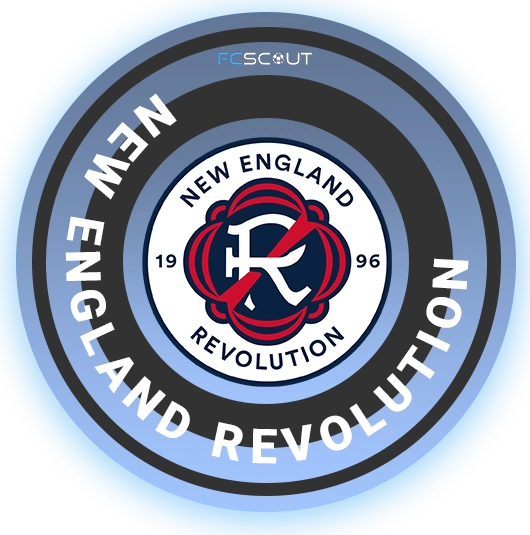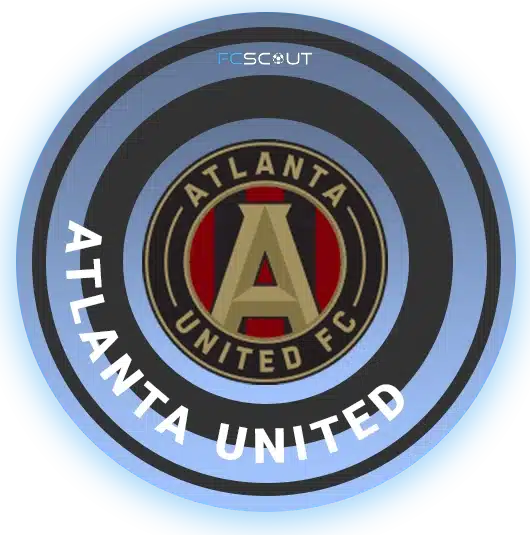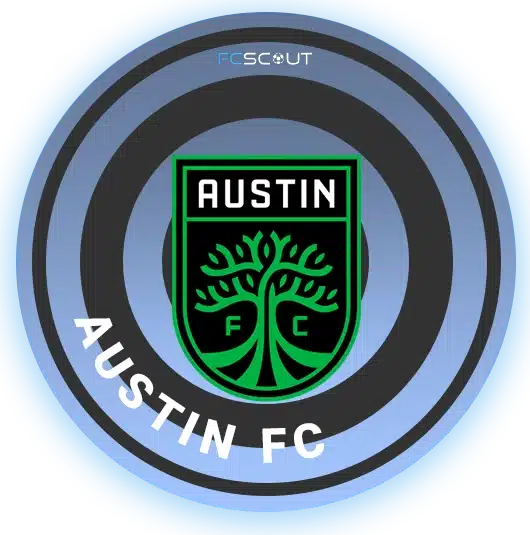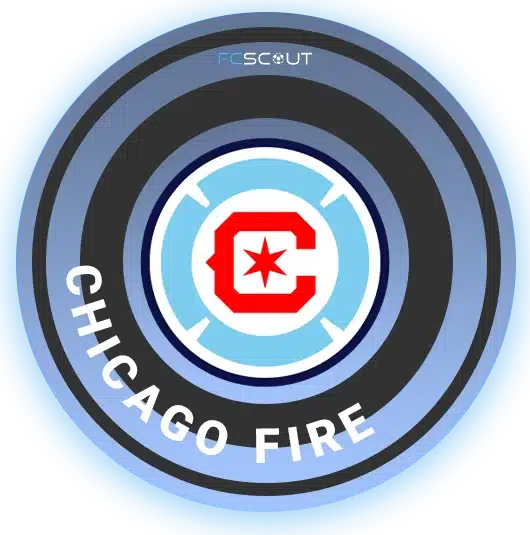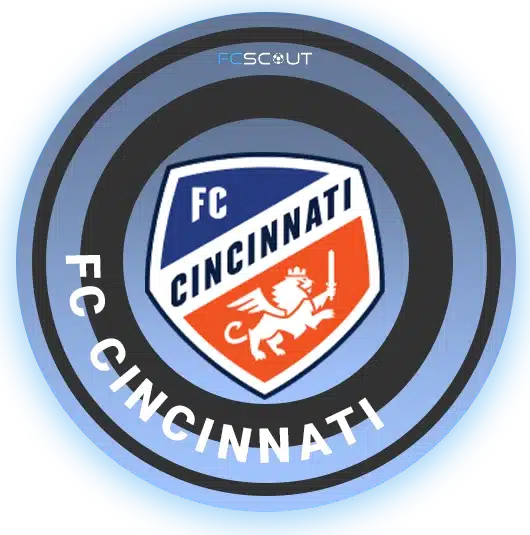NEW ENGLAND REVOLUTION CLUB GUIDE
History, Stadium, Players, and More!
Discover the world of soccer with fcscout.com, your go-to scout for club tryout information, club guides, player profiles, in-depth product reviews, and more.
1000+
team reviews of trending clubs
2M+
active users
annually
1000+
profiles in our player database
Explore
New England Revolution
New England Revolution is an American professional soccer franchise based in the Greater Boston area, Massachusetts. The team competes in Major League Soccer (MLS) as a member of the league’s Eastern Conference.
New England Revolution History
The New England Revolution is a professional soccer club based in the Greater Boston area, competing in Major League Soccer (MLS), the top tier of American soccer. Founded in 1994, the club was one of the original ten charter members of MLS, starting play in the league’s inaugural season in 1996. The team plays its home matches at Gillette Stadium in Foxborough, Massachusetts, also known for being the home of the New England Patriots of the National Football League.
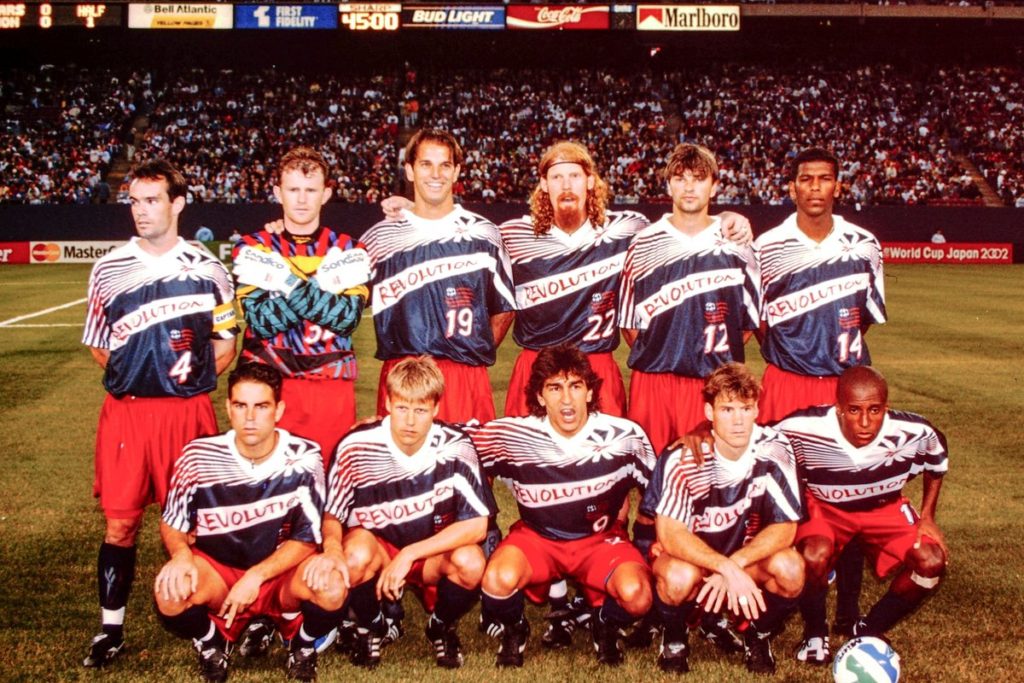
In the early days, the Revolution struggled to find success on the field. Despite the presence of several notable players, including U.S. national team regulars, the team often found itself near the bottom of the league standings. Their first few seasons were marked by underperformance and the club was unable to make a significant impact in the league. This lack of early success set the stage for what would be a long quest for an MLS Cup victory, which eluded them despite reaching the playoffs multiple times.
The turn of the millennium brought changes and gradual improvement for the Revolution. The appointment of Steve Nicol as head coach in 2002 marked the beginning of a more competitive era for the club. Under Nicol’s leadership, the Revolution became a regular contender in the Eastern Conference and began to develop a strong core of players. This era was highlighted by the emergence of stars such as Taylor Twellman, Clint Dempsey, and Shalrie Joseph, who would become cornerstones of the team. From 2002 to 2007, the Revolution reached the MLS Cup final four times but were unable to secure the championship, earning a reputation as a perennial contender but never the champion.
Despite their regular-season and playoff successes, the Revolution struggled to capture major titles, a frustration compounded by their repeated losses in MLS Cup finals and other domestic competitions. This period, however, solidified their status as a formidable force in the league, known for their competitive spirit and strong fan base. The mid-2000s were characterized by thrilling playoff runs and memorable matches, contributing to the growth and passion of the soccer community in New England.
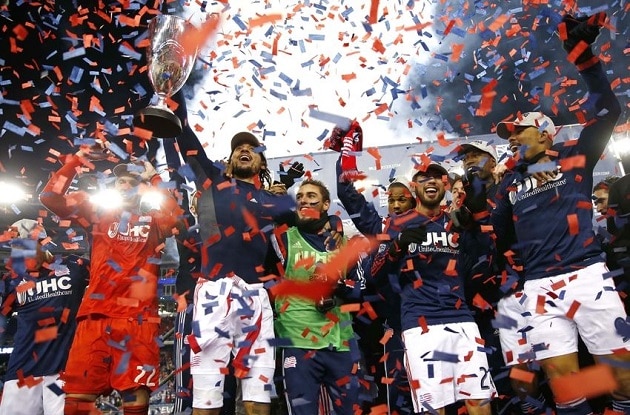
The post-Nicol era brought about a period of transition and rebuilding for the Revolution. The team experienced fluctuations in performance, missing the playoffs several times but also showing flashes of brilliance. New stars emerged, such as Diego Fagundez and Juan Agudelo, who contributed to the team’s attacking flair. The club continued to foster local talent and make strategic signings to enhance the squad. In recent years, the Revolution have focused on integrating young players and developing a dynamic playing style under new management and coaching staff.
As of the latest information available, the New England Revolution continues to compete at a high level in MLS. The club has invested in its youth academy, scouting, and player development to build a sustainable and competitive team. With a dedicated fan base, a history of both thrilling victories and heartbreaks, and a commitment to growth both on and off the field, the New England Revolution remains a staple of the MLS landscape, striving to add an elusive MLS Cup to their trophy cabinet and cement their legacy in American soccer history.
New England Revolution Youth Development Academy
The Revolution Academy is an elite player development program that gives the region’s elite youth player unprecedented access to the MLS professional youth development environment and a defined player pathway to professional soccer.
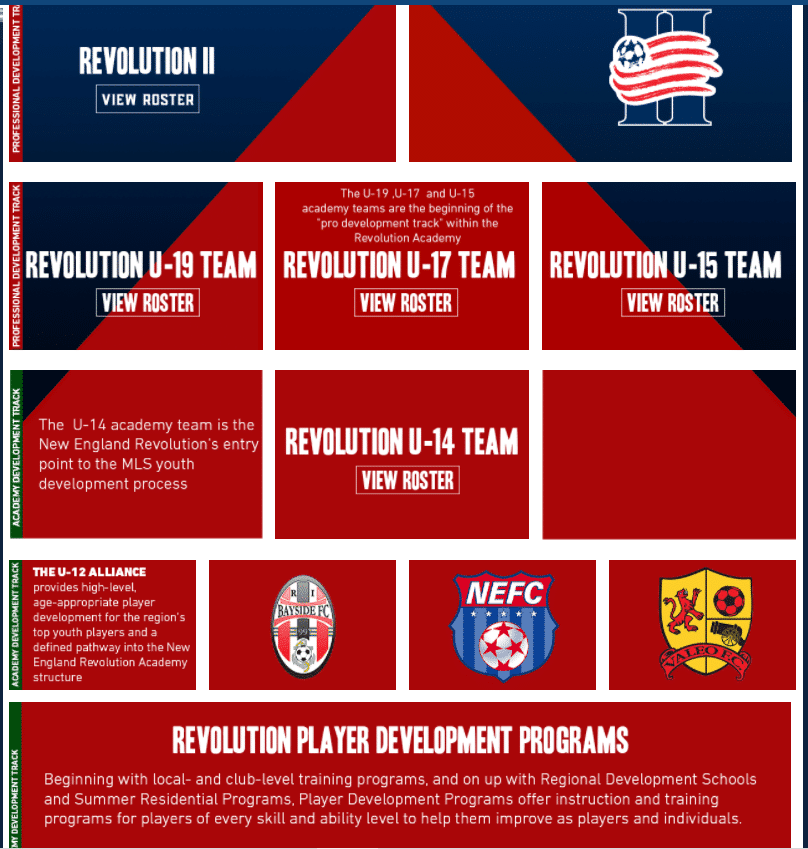
Academy Development Track: Revolution Player Development Programs
The Revolution Academy is one of the most innovative youth training programs in Major League Soccer, recognized by US Soccer as one of the top 10 youth development programs in the country. The Revolution Academy trains players of all abilities in all aspect of the game, including ball mastery, speed of play, coordination and balance and movement with and without the ball. These clinics will help players feel comfortable with the ball at their feet where they will see more success on the field.
New England Revolution Developmental Programs
Our Revolution Academy Coaches will create an atmosphere and design training sessions that allow for creativity, individuality, and imagination. Players will be encouraged to train and play with freedom in a unique environment. Focus will be on moves, ball mastery, fakes, feints, finishing, and speed of play.
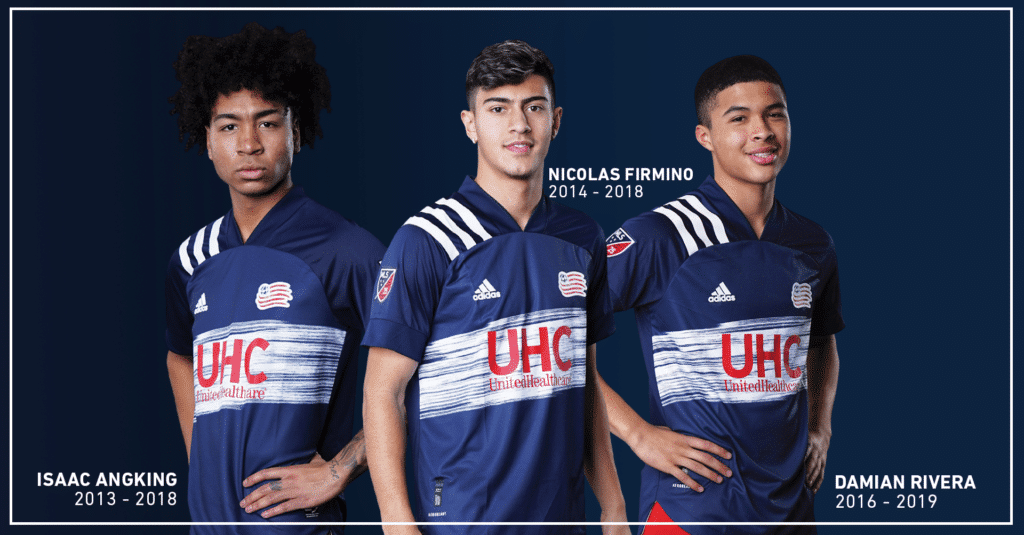
Search for program events by clicking here.
New England Revolution Elite Programs
Elite Full Day & Elite RDS Academy
The Revolution Academy are very happy to announce the new Summer 2020 Elite Full Day Academy & Elite RDS Academy program schedules, in conjunction with our specifically designed “S.A.F.E. Curriculum”. The Revolution Academy will be following all camp guidelines and policies from the Massachusetts Department of Public Health and local Board of Health authorities as the protocols are released and updated.
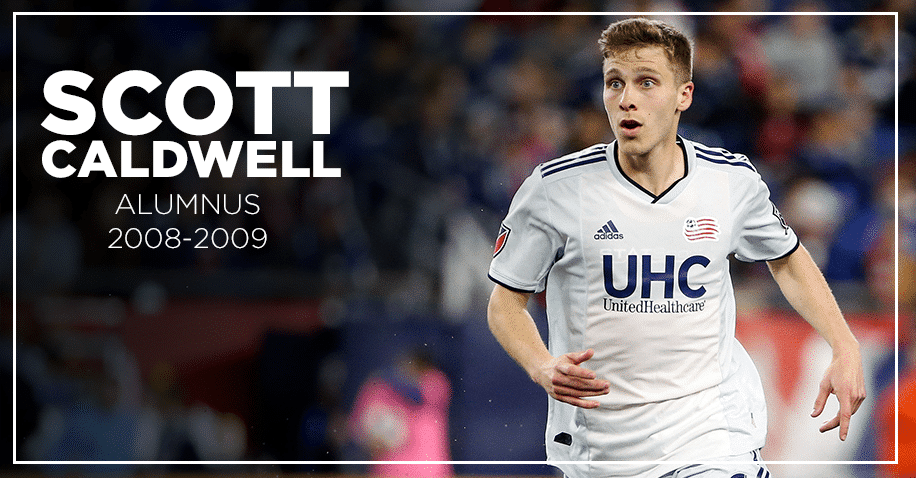
These programs offer players born between 2004 – 2012 the unique experience of developing their skills in a challenging, professional, and fun environment in the highest program level in the Revolution Academy summer training.
Search for Elite program events by clicking here.
New England Revolution Elite Team Academy Week
Best suited for High School / Premier / Club teams U12 – U18 | Boys / Girls
The Elite Team Academy program is designed to give specific teams a unique training experience where they can prepare for the upcoming season, while building consistency, improving their tactical understanding and developing their overall team chemistry. To enroll a team into this program, please contact the Residential Academy Director: Karl Spratt – (508-384-9242) / [email protected]
Brochure for this Elite Team Academy week can be found by clicking here.
New England Revolution Academy Development Track: The U-12 Alliance
The U-12 Alliance provides high-level, age-appropriate player development for the region’s top youth players and a defined pathway into the New England Revolution Academy structure.
Bayside F.C.
Bayside F.C., established in 1997, is a highly successful premier club in Rhode Island and Southeastern Massachusetts. With over 475 players in our program, our club is built on a strong foundation of player development and success. We are Rhode Island’s Premier Soccer Club. To learn more about this club, please click here.
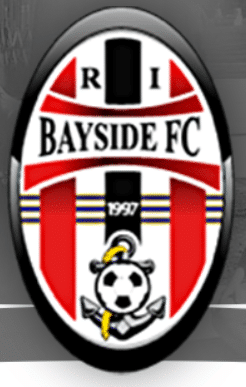
NEFC
NEFC is a not for profit premier soccer club which develops and trains youth soccer players, ages 6-23 in Massachusetts, New Hampshire and Rhode Island. Through a staff of over 85 NEFC trains over 3000 youth players. To learn more about this club, please click here.
To tryout for NEFC, please click here.
Valeo FC
Valeo F.C. is made up of an international staff consisting of former collegiate and professional players. Lead by Emelio Williams & Corlton Simmond our players-first club prides itself on prioritizing each player’s goals and helping them reach those goals. We develop players & people and have a long history of winning soccer.
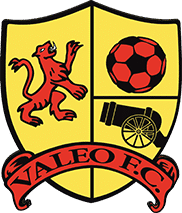
Our club is a registered 501(c) (3) non-profit sports education and training organization focused on developing competitive athletes, outstanding citizens, and strong leaders. We provide a challenging and rewarding environment that teaches the virtues of Teamwork, Discipline, Hard Work, Commitment, Respect, and Leadership. To learn more about this club, please click here.
To tryout with Valeo FC, please click here.
New England Revolution Academy Development Track: Revolution U-14 Team
The U-14 team is the New England Revolution entry point to the MLS youth development process.
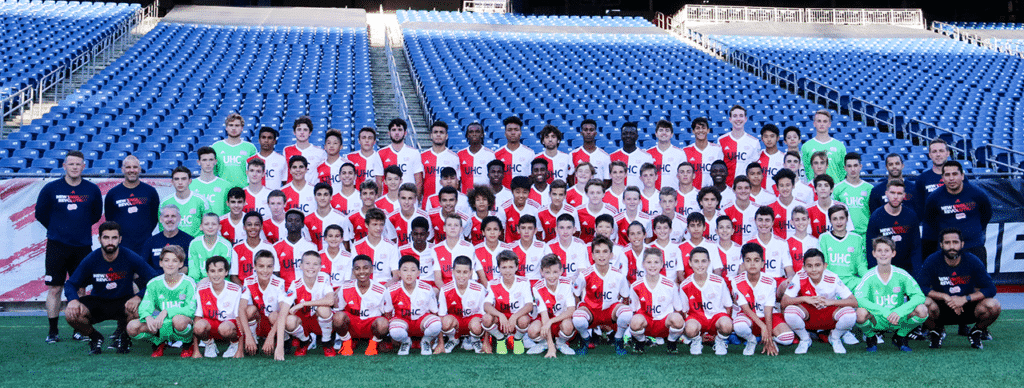
New England Revolution Professional Development Track:
The U-15, U-17, and U-19 academy teams are the beginning of the “pro development track” within the revolution academy. Current rosters for those teams can be found by clicking here.
Revolution II
New England Revolution II is a professional soccer club based in the Greater Boston area that competes in the USL League One, the third division of American soccer. The team is owned by, and operates as the reserve team of the Major League Soccer club New England Revolution. The team plays at Gillette Stadium. The team was announced as a member of League One on October 9, 2019.

To learn more about the New England Revolution II club, please click here.
New England Recruitment Trials
At the time of this writing, there is no official publishing’s on New England trials. Please come back at a later date while we monitor this club or click here to visit their official news section.
CREATE A FREE RECRUITMENT PROFILE
Click the ‘LEARN MORE’ button below to take your career to the next level and create a fcscout.com recruitment portfolio to help clubs, coaches, agents, and scouts easily find you. For a limited time, we are offering this service for free!
New England Revolution Colors & Badge
The New England Revolution’s primary colors are navy blue, red, and white. These colors are a nod to the American Revolution, which is a central theme of the club’s identity, reflecting the historical significance of the New England region in the American Revolutionary War. The colors are used throughout the team’s branding, from their jerseys and merchandise to their promotional materials.
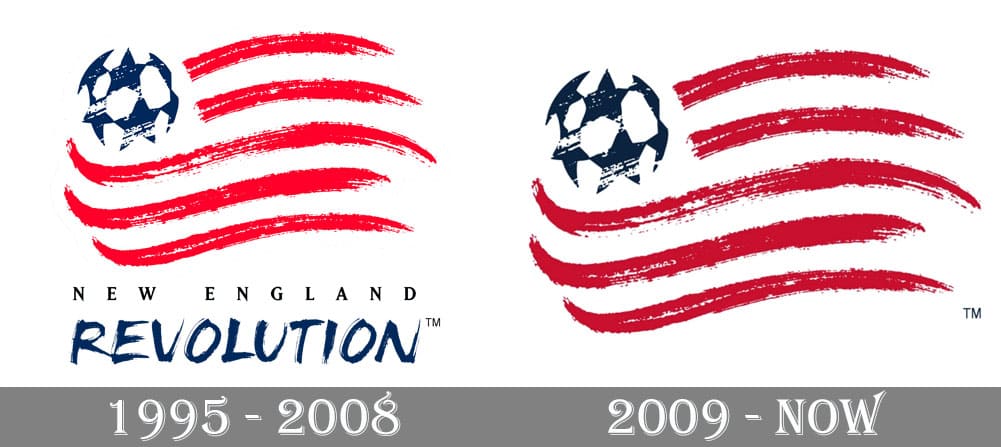
The badge of the New England Revolution is designed with a patriotic theme, emphasizing the club’s connection to American history. The main element of the badge is a stylized, modern interpretation of the American flag. It features a blue field with six white stripes, representing the six New England states (Massachusetts, Maine, New Hampshire, Vermont, Rhode Island, and Connecticut). A red stylized soccer ball is located in the upper left corner, symbolizing the sport and the team’s competitive spirit.
This crest is encircled by a navy blue ring, which contains the full team name “New England Revolution” in white lettering. The entire design is meant to evoke feelings of patriotism and regional pride while also clearly identifying with the sport of soccer. The badge and colors are distinctive in Major League Soccer, helping to create a unique and recognizable brand for the team.
New England Revolution Kit
The New England Revolution’s kit typically reflects the team’s primary colors of navy blue, red, and white. Over the years, these colors have been utilized in various designs, symbolizing the team’s identity and heritage. The home kit usually features a dominant navy blue color scheme, often complemented by red and white accents to highlight the team’s traditional colors and to pay homage to the American Revolution’s historical significance.
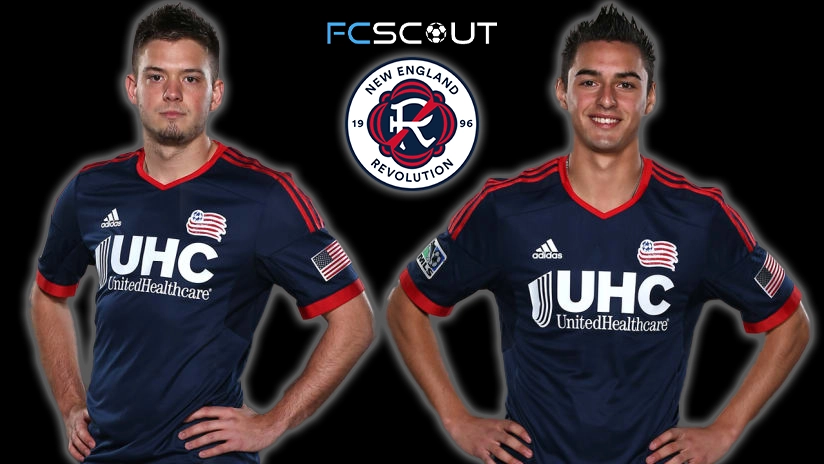
The away kit generally offers a variation that might include more predominant use of white or red, providing a contrast to the darker home colors. These kits often feature creative designs that incorporate elements of the club’s badge and color scheme in different ways, ensuring the team is easily recognizable on the field.
In addition to the primary and secondary kits, the team may also have special edition uniforms for certain occasions or as part of league-wide initiatives, such as environmentally friendly kits or those commemorating significant events or anniversaries. These special kits adhere to the same color palette but might include unique design elements or patterns.
The kits are not only a part of the team’s identity but also a symbol for fans, representing their support and loyalty to the club. As with most professional sports teams, the Revolution’s kit designs may change from season to season, allowing for new interpretations of the team’s colors and badge while maintaining the overall essence of the club’s identity.
New England Revolution Stadium
The New England Revolution play their home games at Gillette Stadium, located in Foxborough, Massachusetts. This venue is situated approximately 22 miles southwest of downtown Boston. Gillette Stadium is primarily known as the home of the New England Patriots of the National Football League (NFL), but it has been the home ground for the Revolution since the stadium opened in 2002.
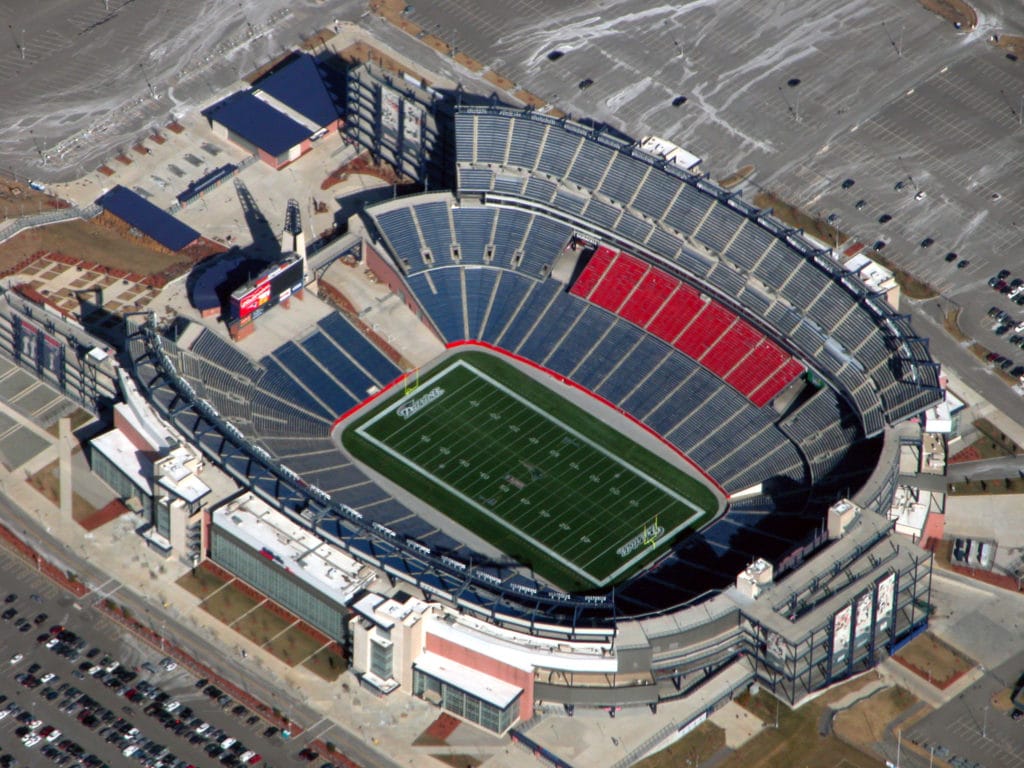
Gillette Stadium has a seating capacity of around 65,000 for football games, but this is often reduced for soccer matches to create a more intimate atmosphere, typically to around 20,000 by curtaining off upper sections. The stadium features a natural grass surface, which is preferred for soccer, and provides modern amenities and facilities for players and fans alike, including spacious seating, concession areas, and a state-of-the-art video screen.
Despite being one of the larger venues in Major League Soccer, there have been discussions and desires expressed over the years by both fans and the club’s ownership about the possibility of constructing a soccer-specific stadium for the Revolution. Such a venue would ideally be smaller and designed specifically for soccer, providing an atmosphere and experience tailored to the sport. However, as of my last update, the team continues to play at Gillette Stadium.
The stadium’s location in Foxborough, while not in downtown Boston, is a nod to the region’s sports culture and has ample parking and tailgating spaces, making it a popular venue for both soccer and football fans. Despite the ongoing discussions about a potential new stadium, Gillette has been integral to the history and identity of the New England Revolution, hosting countless memorable matches and events throughout the team’s history.
New England Revolution Club Culture
The club culture of the New England Revolution is deeply intertwined with the broader sports culture of New England, known for its passionate and loyal fan base across all sports. The Revolution’s fans are no exception, displaying a deep commitment and enthusiasm for their team. This is embodied in the club’s supporter groups, with the most prominent being the Midnight Riders and The Rebellion. These groups are known for their energetic and continuous support during matches, creating a vibrant and intimidating atmosphere at Gillette Stadium with chants, songs, and visual displays.
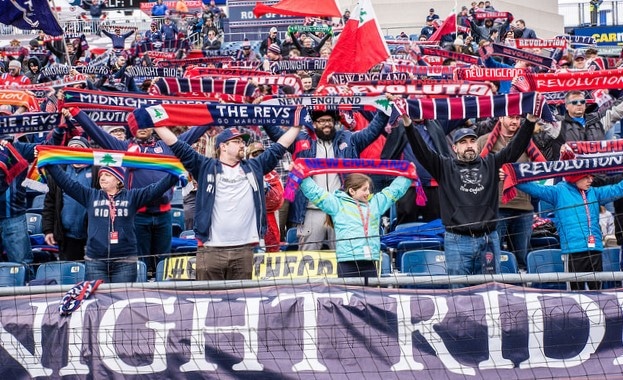
The name “Midnight Riders” is a reference to the historical midnight rides of Paul Revere and William Dawes, which are of significant importance to the New England area due to their role in the American Revolution. This historical nod reflects the region’s pride in its heritage and the club’s identity. The Rebellion, similarly, takes its name from the broader context of the American Revolution, emphasizing the rebellious spirit and the fight against oppression.
The culture of the club is also characterized by its community involvement and charitable efforts. The Revolution is active in local communities, participating in events and initiatives that promote soccer, youth development, health, and education. This commitment extends beyond the pitch and is a crucial part of the club’s identity and relationship with its fans and the New England region at large.
Tailgating before matches is a common practice among fans, mirroring a tradition seen with the New England Patriots and other regional sports teams. This pre-game ritual fosters a sense of community and camaraderie among supporters, contributing to the unique game-day experience.
On the field, the team’s culture has been one of resilience and determination. Despite the early years of struggle and the heartbreaks in MLS Cup finals, the club has maintained a competitive spirit, mirroring the historical resilience of the New England region itself. This perseverance is a source of pride for fans and is reflected in the team’s ongoing quest for success.
Overall, the club culture of the New England Revolution is a reflection of New England’s rich historical background, its passionate sports culture, and a community-oriented approach. The fans’ loyalty, community involvement, and the historical themes that run through the club’s identity all contribute to a unique and enduring culture within Major League Soccer.
Foxborough, Massachusetts
The New England Revolution represents the broader New England region rather than a specific city, which is a unique characteristic compared to many other Major League Soccer teams that are based in and named after a single city. The New England region comprises six states: Connecticut, Maine, Massachusetts, New Hampshire, Rhode Island, and Vermont. However, the team is primarily associated with the Greater Boston area, as its home venue, Gillette Stadium, is located in Foxborough, Massachusetts, which is about 22 miles southwest of downtown Boston.
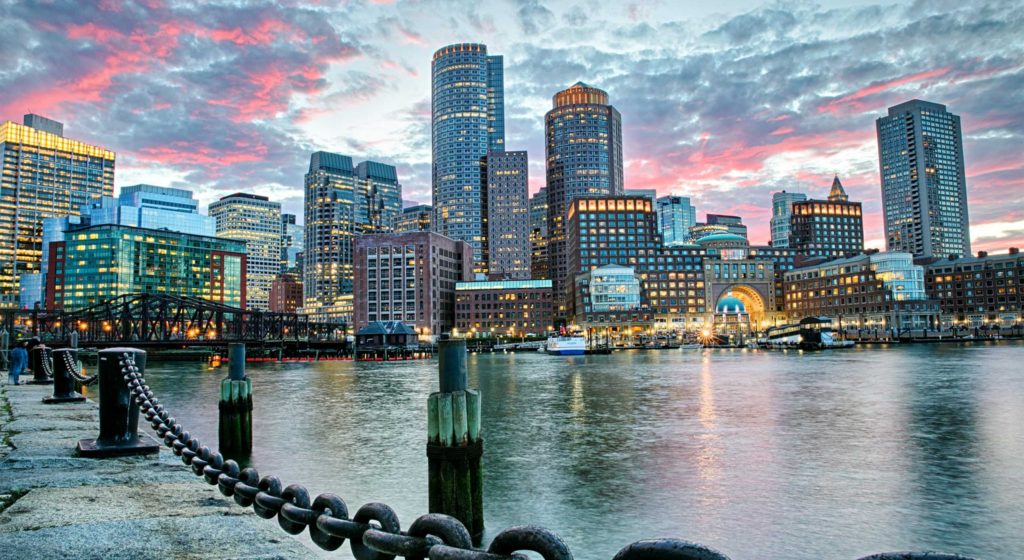
Boston, the largest city in New England and one of the oldest cities in the United States, serves as the cultural and economic hub of the region. It is known for its rich history, which includes key events in the American Revolution such as the Boston Tea Party and the Battle of Bunker Hill. This historical significance is reflected in the team’s name and branding.
The city and the surrounding region are known for their passionate sports culture. Boston’s residents are fervently supportive of their local teams, with a deep-seated tradition of backing the Celtics (NBA), Bruins (NHL), Red Sox (MLB), and Patriots (NFL). The Revolution is part of this storied sports landscape, contributing to the region’s reputation as a stronghold of American sports.
The Greater Boston area is also renowned for its educational institutions, including Harvard University and the Massachusetts Institute of Technology (MIT), which contribute to a vibrant, young, and international demographic that supports soccer and the Revolution. Additionally, the region’s diverse cultural landscape and strong community ties provide a broad fan base for the team.
While the team represents the entire New England area, the cultural and historical aspects of Boston and its surrounding areas heavily influence the club’s identity and fan culture. The Revolution embodies the region’s history, its sports-crazed nature, and its community values, making it a unique representative of New England in the MLS.
Explore More Clubs
CREATE A FREE RECRUITMENT PROFILE
Click the ‘LEARN MORE’ button below to take your career to the next level and create a fcscout.com recruitment portfolio to help clubs, coaches, agents, and scouts easily find you. For a limited time, we are offering this service for free!

